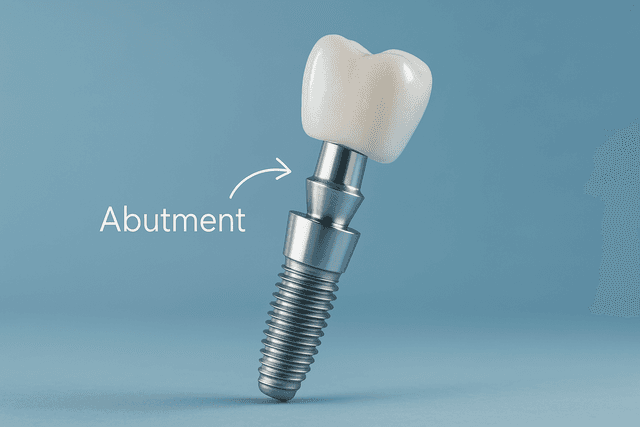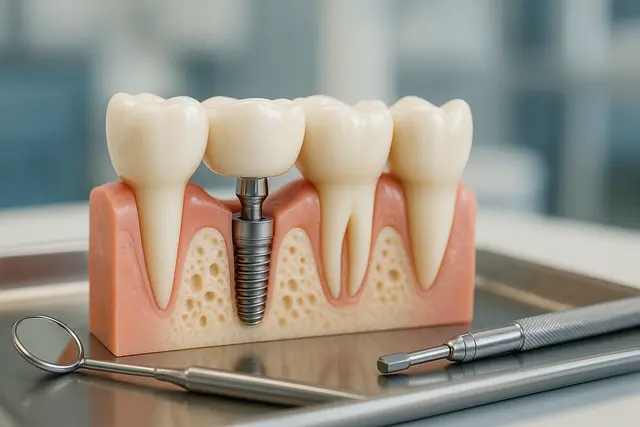Prosthodontics
5 min read
Mar 28, 2025
Dental Implants vs. Bridges: When to Choose Each
Tooth loss can impact more than just your smile. It can change how you chew and speak, affect your jawbone, and lead to other teeth shifting out of place. Replacing a missing tooth helps restore function and prevents future oral health problems. Dentists often recommend either a dental implant or a dental bridge, depending on your situation. Both options can be effective, but one may be better than the other depending on your oral health, lifestyle, budget, and long-term needs.

Implant vs Bridge: A Speed‑Dating Snapshot
Think of the first appointment as a quick meet‑and‑greet. A dental implant is an artificial tooth root anchored in bone, while a dental bridge literally bridges the gap using two or more crowns fused to an artificial tooth. Implants are small threaded posts made of titanium; bridges are typically porcelain or metal fused to porcelain. Each treatment option can look natural and last a lifetime, yet the road to get there feels different.
Dental Implant: Modern Tooth Root Magic
Your dentist places the dental implant into your jaw, waits for bone to hug it, then tops it with a dental crown matched to the rest of your teeth. Dental implants are small threaded devices, and a single tooth implant can often stand alone without asking surrounding teeth to help. Candidates for dental implants need healthy gums, good bone, and patience for healing.
The American Dental Association notes that dental implants can last decades with steady hygiene. Advantages of dental implants include stopping bone loss, keeping adjacent teeth from drifting, and letting you chew steak like it never left. Cons of dental implants? Surgery, time, and the cost of implants, especially if dental insurance refuses to play ball. Implant failure is rare, but smoking and unchecked diabetes invite trouble around the implant.
Dental Bridge: The Classic Gap Filler
A traditional dental bridge consists of crowns on abutment teeth with a false tooth dangling in the middle. This bridge in place feels sturdy fast; the bridge is ready in a few weeks, not months. A common type of dental bridge is the cantilever bridge, handy when only one tooth stands next door.
Another type of bridge, the Maryland bridge, bonds a lightweight wing to the back of neighboring teeth with dental cement. Types of dental bridges vary, yet every bridge may need the dentist to shave down healthy teeth. That trade‑off can bother people who hate touching sound enamel. Still, dental bridges are generally quicker, cost less upfront, and the dental laboratory can make a dental bridge that blends right in.
Implants and Bridges: How They Stack Up
Implants replace the tooth root and protect bone; bridges replace the visible part and leave bone to shrink a bit. Dental implants vs dental bridges is not simply high‑tech versus old‑school; it is lifestyle math. Implants also make flossing easy, just swoop around the post, while bridges require threading under the span.
Bridges and implants both share risk: tooth decay can sneak beneath a bridge; peri‑implantitis can threaten an implant. One or several missing teeth are dental implants’ playground, yet a long implant‑supported bridge can span multiple spaces when bone volume is thin in spots.
Replace a Missing Tooth: Decision Checklist
Bone and Gums – If the lost tooth happened years ago, bone might be shy. Partial denture, bridge, or bone graft with implant dentistry enters the chat.
Number of Gaps – Single tooth gone? Either works. One dental bridge literally bridges small gaps; an implant is an artificial tooth that stands alone.
Speed – Need new teeth yesterday? Bridges win.
Budget – Dental bridges cost less upfront; dental implants require more now, less later.
Oral Habits – Clench, grind, skip floss? Your implant needs gentler love.
Long Game – Dental implants may stimulate bone and usually outlive bridges. Ask your provider which options are dental bridges versus implant‑supported choices that suit your mouth, not your neighbor’s.
Dental Implants and Bridges: Comfort, Care, and Lifestyle
Implants vs bridges in daily life feels like sneakers vs loafers. With a bridge, food sometimes lurks beneath a bridge, calling for special flossers. With an implant and a bridge combo, yes, you can anchor a cantilever bridge atop two implants, cleaning is simpler. Support the implant with an electric brush and low‑abrasive paste; use dental water flossers to rinse away salsa. Whether you pick implants or bridges, regular dental treatments every six months keep the rest of your teeth happy.
Cost of Implants, Insurance, and Dollar Sense
Getting a dental implant can feel like buying a used car, while a bridge may feel like buying a nice bike. Cost of implants varies by city, bone grafts, and whether sedation is your love language. Dental insurance often covers a percentage of a dental bridge but only a nibble of an implant dentistry bill.
Ask if your plan calls implants experimental. Bridges vs implants in pure dollars favors the bridge; dental implants are two‑stage operations with parts from screws to the final dental crown made in a dental laboratory. Yet dental implants last longer on average, so lifetime cost evens out.
Implant and a Bridge Together: Hybrid Hacks
Sometimes the mouth wants both, a single implant can anchor a small bridge where abutment teeth are missing. An implant‑supported bridge means fewer posts, less grafting, and no shaving of adjacent teeth. Bridge consists of crowns linked as a unit, resting on implants that act like tooth roots. This hybrid can replace missing teeth in a row while keeping surgery minimal.
Tooth‑Friendly Tips To Avoid Repeat Tooth Loss
Brush twice, floss once, and swish to protect natural teeth.
Skip ice‑chewing unless you crave another lost tooth story.
See your dentist if a crown chips or partial denture clasps loosen. Early tweaks keep dental restoration intact.
Dental Blog Wrap‑Up: Your Next Bite
So, what’s better, mplants or bridges? The answer hides in bone scans, lifestyle, and wallet size. If you crave a fix that could last a lifetime and you don’t mind a few months of healing, lean toward the implant. If you need speed, have strong abutment teeth, and prefer to spend less now, a bridge may suit you.
Talk through advantages of dental implants, the cons of dental implants, and the nitty‑gritty of bridge care with a provider you trust. A good clinician will weigh implant needs against the health of surrounding teeth and guide you with humor, honesty, and maybe a goofy tooth model. Whichever path you choose, remember: use dental wisdom daily, because the rest of your teeth are cheering for you.
What Is the Main Difference Between a Dental Implant and a Bridge?
A dental implant replaces both the tooth root and crown, anchoring securely into the jawbone, while a dental bridge only replaces the visible part of the tooth and relies on neighboring teeth for support. Implants prevent bone loss and don’t require altering nearby teeth, while bridges offer a faster solution but may involve shaving down healthy enamel.
Which Option Lasts Longer: Dental Implant or Bridge?
Dental implants typically last longer, often several decades, when properly maintained. Bridges generally last 10 to 15 years before needing replacement. While bridges may cost less upfront, implants often offer better long-term value due to their durability and lower replacement frequency.
Who Is a Better Candidate for a Dental Bridge?
A dental bridge may be better suited for patients who lack sufficient bone for an implant, need a quicker solution, or prefer a more affordable upfront cost. It’s also ideal when the surrounding teeth are already in need of crowns. However, bridges may not prevent future bone loss the way implants do.
Can a Dental Implant Support a Bridge?
Yes, dental implants can be used to support a bridge, especially when multiple adjacent teeth are missing. This hybrid option avoids relying on natural teeth for support and reduces the need for multiple implants. It’s a great way to replace several teeth with fewer surgical procedures.
Read Next
Related Posts

Prosthodontics
Caring for Implant Supported Bridges: How to Keep Them Strong and Healthy
Caring for your implant-supported bridge is just as important as getting it placed. These restorations are designed to look, feel, and function like natural teeth, but they need consistent care to stay that way. With the right cleaning habits and maintenance routine, you can protect your investment and keep your smile strong and healthy for years.
5 min read
Oct 14, 2025

Prosthodontics
Implant Abutment Explained: What It Is and Why It Matters
Dental implants have revolutionized the way we restore missing teeth, but there's more to them than just the visible crown. One often-overlooked component, the implant abutment, plays a crucial role in both the function and appearance of the final result. Understanding what it is and why it matters can make all the difference in your implant journey.
4 min read
Oct 10, 2025

Prosthodontics
Pros and Cons of Implant Retained Bridges: A Simple, Honest Overview
Missing teeth can affect more than just your smile, they can impact your confidence, speech, and even how you eat. With so many options out there, it’s easy to feel lost in dental jargon and marketing buzzwords. That’s why we’re breaking down implant retained bridges in plain English, highlighting the pros and cons so you can make an informed choice without the fluff.
6 min read
Oct 10, 2025
Don’t have time to research every dentist around you?
See why 30k+ patients trusted us